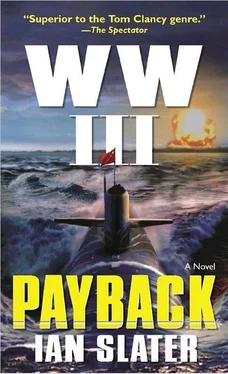“Tiffs?” challenged Brady. “That’s a Limey word.”
“So?” said Salvini. “I must’ve picked it up from Aussie or Choir.”
“You’ve been hanging out too long with Brits and Aussies,” Brady joshed. “Tiff — you mean Beijing and Moscow are having a fight! ”
“Yeah,” said Salvini, “a row. Flexing their muscles. Staking out their territory.”
“ Their territory!” said Johnny Lee. “It’s international waters. And any further west, the HAN’d be within North Korea’s two-hundred-mile economic zone.”
Freeman ignored the others’ patter. The legal niceties of maritime law were fictions of academe insofar as underwater operations were concerned. Every man in the team understood this, and all of them had known at least one SEAL who, during the Vietnam War, had participated in the clandestine “officially deniable” missions into North Vietnam’s Haiphong Harbor. From the littoral, they had made their way undetected into the very sewers of Hanoi, where sudden unexplained explosions, suspected by NVA officials of being caused by gas leaks, occurred in the vast subterranean system beneath Hanoi.
The question now for Freeman was, had any vessel — warship, surface, or commercial—“pinged” the RS and alerted the North Korean coastal guard? One of the general’s better traits, as recognized by all who had served close to him, was his readiness to consult subordinates, his willingness to ask advice ironically only adding to his reputation as a leader who knew more than most. Aussie Lewis, Salvini, and Choir, who had served with Freeman the longest and so could read him quicker than the others, sensed that the general was wrestling with uncharacteristic indecisiveness. But they understood why — there was nothing quite as unsettling in an RS or any other submersible as the feeling of having been pinged by a possible hostile. It meant having your range of possible reactions thwarted by the fear of massive retaliation should you “jump the gun,” react too quickly. In so doing, you’d give your potential adversary the inestimable advantage of knowing your precise latitude and longitude, not to the nearest mile, as in the days of World War II, but, in a world of global positioning satellites, to the nearest foot.
“We’ve got state of the art in this tub, General,” said Aussie encouragingly. “I’d bet ten to one no one zaps us with their sonar. Shit, we’re no bigger’n a fucking killer whale. Fuckin’ rocks on the bottom are bigger’n us.”
Freeman nodded appreciatively, his impressive build seemingly bifurcated by the search scope’s sleek column. “Thanks, Aussie,” he said. “But you’d bet on it raining in the Sahara!”
There was a burst of laughter, more because they all needed to vent what some SpecFor types referred to as “impan-itis”—impatience anxiety.
“I wouldn’t bet on rain in the desert, General,” said Eddie Mervyn. “But I’m with Aussie on this one. This ‘tub,’ as he calls it, has gone through more SDTs than—”
“Speak fucking English!” cut in Aussie.
“What — oh, SDTs — sonar detection tests — out of Greenport. Scores of ’em, and not one rebound. Not one. This baby’s CR, composite rich. Not enough metal in her to fill your tooth.” Eddie’s exaggeration, gross as it was, nevertheless got the point across.
“I agree,” added Gomez, whose right eye was becoming irritated by a dab of camouflage paint that had worked its way into his cornea, causing his eyelid to blink, creating the bizarre impression that he was winking madly at Eddie Mervyn. He closed the eye momentarily, hoping to wash away the foreign matter and resenting the fact that all this “war paint” might be unnecessary if they didn’t execute the mission they’d spent so much short-time, high-pressure preparation on. In any event, Gomez’s usually even-tempered nature was aggravated by both the great decisive general’s present indecisiveness and by the fact that if they did go in to Beach 5, he and Mervyn would have to stay aboard the RS as the getaway drivers. So why the hell did they need war paint? “All dressed up and nowhere to go,” he muttered.
“What?” Freeman’s voice was sharp, unforgiving.
“Ah — nothing, sir. I — ah, just making a joke.”
“I’m not in the mood for goddamn jokes, Gomez. If you’ve got anything to contribute, contribute. Otherwise, keep quiet.”
Gomez swallowed hard, but surprised everyone by tapping the waterfall screen and immediately adding, “Sir, the weather topside’s so bad that even down here at sixty feet we’re still in subsurface turbulence. Even if that HAN, or anyone else, was pinging us — which I can’t hear at the moment — incoming sound waves are in ‘extra rinse’ mode. Everything’s scrambled — long as we don’t go deeper below the turbulence.”
Freeman nodded and placed his hand on Gomez’s shoulder. “Thanks. I think you’re right.” The general paused and looked around at his team, his gaze resting on Choir Williams. “One thing, Gomez—” The general grinned slightly. “If we’re still in subsurface turbulence, how come Mr. Williams here is not bringing up his breakfast?”
“He’s fuckin’ drunk!” joked Aussie Lewis, always one to press the humor envelope despite, or rather to spite, any official instruction not to.
Gomez indicated the four-inch-square data block left of the waterfall that showed all four retractable stabilizing fins not out to their full length but extending and retracting in response to the water flow probes that were sending a steady stream of data to the stabilizer’s computer. “It’s only a matter of nanoseconds,” Gomez explained, “between data inflow and stabilizer adjustment — so fast, our bodies don’t even register it.”
“Thank you, Mr. Gomez,” said Choir with mock solemnity. “And no, I am not inebriated, as my vulgar antipodean friend has charged.”
“Good,” said Freeman. “Then we’re good to go.” It was stated as a decision, not a question. Time to push all jitters aside. He had pitted his concern for his men against the possibility that the HAN or some other vessel knew of their presence, now only eight minutes away from what the computer’s chart told them was Beach 5’s surf line, and he was convinced that the HAN’s presence was merely coincidental. It was a big sea — bound to be other traffic. Even if NKA intel had got a heads-up of him and his team en route to Japan, even if somehow one of their field agents had been lucky enough, or “tinny” enough, as Aussie would have put it, to have spotted the Galaxy in Hawaii, what would they have reported? It was against this possibility that he had ordered the three foam-plastic mounts be duct-taped equidistant apart on top of the RS before it was shrouded in the opaque khaki helo wrap. Anyone spying this shape would most likely see the outline of a long Chinook-like chopper with forward and aft rotors and an engine mount in the middle. And the general would not let his recent obsession with the “damn onions’ ” low sulfur content and the relatively high sulfur content of Russian missile propellant stand in his way. He knew ever since his days as a young officer that human nature in war, just as in peace, often seeks reasons to postpone action rather than risk entering the unknown. A good leader knew when one should no longer take counsel of one’s fears, Freeman recalling how FDR had led his nation out of the dark with his fearless statement “All we have to fear is fear itself.”
“Beach, four thousand yards,” Mervyn said matter-of-factly, though he knew that they were approaching the point of maximum danger, when the general would have no option but to raise the search scope on infrared to see the beach. So paranoid was the Hermit Kingdom, the Dear Leader’s coastal defense troops had the unsettling habit — as long confirmed by SATPIX recon — of stopping their searchlight trucks along the coast road and sweeping the beaches and rocks with their 2,000-watt beams.
Читать дальше












